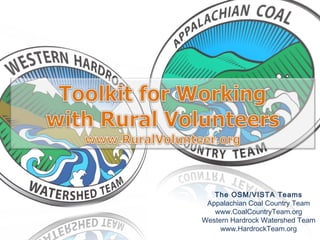
Toolkit for Working with Rural Volunteers
- 1. The OSM/VISTA Teams Appalachian Coal Country Team www.CoalCountryTeam.org Western Hardrock Watershed Team www.HardrockTeam.org
- 2. Appalachian Coal Country Team ACCT PA, OH, MD, WV, VA, KY, TN, AL Western Hardrock Watershed Team WHWT CO and NM
- 4. “Volunteers for Rural Watersheds” Research Project o 3-year research project o Seek to develop tools and resources to make volunteerism work better for rural community/watershed groups o Started in Summer 2008 o Funding from EPA’s Office of Wetlands, Oceans, and Watersheds (OWOW) to explore: o Who are volunteers and what services do they provide? o What are the most effective ways to manage volunteers? o Why and where are these strategies successful? o How can we get these findings and effective strategies into the hands of as many people as possible? Toolkit for Working with Rural Volunteers www.RuralVolunteer.org
- 5. Toolkit for Working with Rural Volunteers www.RuralVolunteer.org Project Overview • Phase 1: Collected and analyzed survey data from volunteer base of 16 organizations • Phase 2: Identified 25 volunteer management practices being done successfully by rural groups; transplanted and documented trial practices for one year • Phase 3: Outreach and dissemination of information through workshops, workbook, website, webinars, etc.
- 6. Toolkit for Working with Rural Volunteers Phase 1: Volunteer Surveys Survey asked: • How did these rural watershed volunteers get involved with their organizations? • What are some of their personal characteristics? • What capacity do they serve for their respective organizations and communities? • How might they be further engaged in volunteer activities in the future? • Practical issues such as volunteer availability and provision for follow-up interviews. www.RuralVolunteer.org
- 7. Toolkit for Working with Rural Volunteers www.RuralVolunteer.org What we learned: A "typical” volunteer for a rural watershed group: – Adult (average 50 years old) – Married (65%) with children (63%) – Employed full-time (49%) – Has bachelor’s degree (39%) – Making between $20,000 and $39,000 per year – Residing within the watershed (area served by organization)
- 8. Toolkit for Working with Rural Volunteers www.RuralVolunteer.org What we learned: • 70% of volunteers had friends who were part of the organization prior to participation • Became involved in organization through a friend involved with the watershed group (36%) or through a family member involved with the watershed group (18%).
- 9. Toolkit for Working with Rural Volunteers www.RuralVolunteer.org What we learned: – Are highly involved in local organizations, most commonly: a conservation organization (48%); a church-affiliated group (46%); a civic or political organization (44%). – Report high civic engagement: • 90% voted in the 2008 presidential election • 82% voted in a local election in 2006 or 2007 • 79% voted in the primary election • 63% contacted a member of Congress or state legislature for any reason • 51% contacted a local government official about a policy issue
- 10. Toolkit for Working with Rural Volunteers www.RuralVolunteer.org Phase 2: Testing Volunteer Management Practices • Designed to identify successful volunteer management practices then monitor application by other organizations – Found practices or strategies being used with success by other organizations within the ACCT/WHWT – Transplanted 25 successful practices to the participating organizations that need them – Documented successes and challenges for 1 year
- 11. Toolkit for Working with Rural Volunteers www.RuralVolunteer.org 25 Volunteer Management Practices • Skills/needs spreadsheet for board recruitment • Partnership with ATV groups • Church partnerships • Business partnerships • Mandatory service volunteers • Community service volunteers • Student athlete volunteers • Bi-monthly outreach meetings • One-hour board meetings • Volunteer contributions to newsletter • Development of youth advisory board • Formation of youth helper organization • Wild and Scenic Film Festival • Service learning projects • Retired and Senior Volunteer Program • Providing transportation • Water monitoring through partnerships • Water monitoring with individuals • Volunteer appreciation picnic • Constructing a rain garden • Constructing wetlands • Duck race • 5k race • Adopt-a-stream • Fish fry
- 12. 5k Race The Appalachian Coal Country Watershed Team (ACCWT) An OSM/VISTA Initiative www.accwt.org
- 13. Toolkit for Working with Rural Volunteers www.RuralVolunteer.org Phase 3: Create and share rural volunteer management resources – Distillation of all research into Toolkit workbook and website – Not just research but worksheets, checklists, etc for overall volunteer management process – Share on local, state, regional, and national level – Create and conduct training around Toolkit
- 14. Toolkit for Working with Rural Volunteers www.RuralVolunteer.org